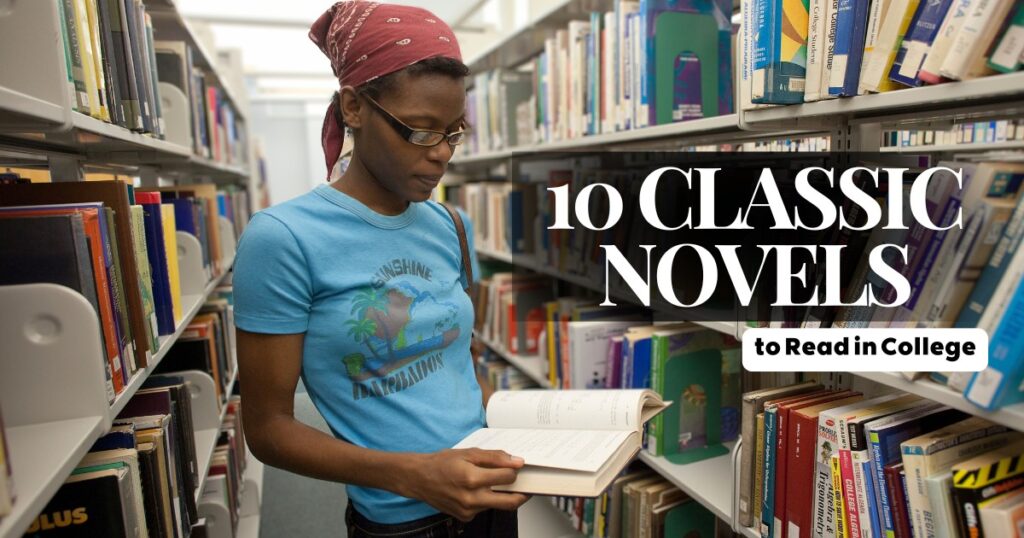Did you know that reading can improve your relationships with others? From enhancing your sleep to keeping your mind sharp, books can work wonders for your mental, emotional, and social health. It’s too bad only half of all adults read them every year!
College is the perfect time to form strong habits — and reading will continue to benefit you long after you graduate. Skip the CliffsNotes! Here are 10 classic literature novels you should read for yourself:
1. “Dracula” (Bram Stoker)
Vampire lit remains as popular as ever — and Dracula is the novel that helped launch the genre into the mainstream. This classic tale of good versus pure evil still holds up with its gripping horror, “found-footage-style” mystery, and an ensemble cast of characters. A hybrid of Gothic vampiric lore and Victorian-era technology, Dracula creates an evocative atmosphere of genre-defining dread and intrigue that will keep you turning its pages.
2. “The Hound of the Baskervilles” (Sir Arthur Conan Doyle)
Sherlock Holmes may not have pioneered the detective novel, but he’s undoubtedly the genre’s most famous character. The Hound of the Baskervilles stands the test of time as Sherlock’s most re-told story — a murder mystery involving a family curse, haunted moors, and (of course) a killer dog. It’s a must-read classic representing iconic British literature — and perfect for picking up around Halloween during the fall semester.
3. “Great Expectations” (Charles Dickens)
Pip, an orphan, visits Miss Havisham’s estate as a playmate for her adopted daughter. Havisham’s uneaten wedding cake, decaying bridal gown, and decrepit manor hint that something’s not quite right…. But even with this warning, Pip can’t imagine the tangled web of lies, deception, and debauchery woven around the vengeful bride’s past. Charles Dicken’s Gothic-Victorian novel is rife with romance, plot twists, and colorful characters that linger in the mind long after the final page.
4. “Pride and Prejudice” (Jane Austen)
Jane Austen’s most famous novel is more than just a slow-burn, enemies-to-lovers romance. It’s an entertaining and eye-opening satire about messy love, icy-cold biases, horrible decisions, and human imperfection. You’ll laugh, you’ll sigh, you’ll reflect, and you’ll add some great zingers to your mental bank of book quotations.
5. “The Chronicles of Narnia” (C.S. Lewis)
“Someday you will be old enough to start reading fairy tales again,” writes C.S. Lewis at the beginning of The Lion, the Witch, and the Wardrobe. In this fantasy series, children enter the magical land of Narnia, where epic battles, enchanted creatures, and self-discovery await. This series is an allegory for Christian theology, making it an excellent case study in intertextual allusions (or spotting references to mythology, history, religion, and culture in media). Whether you’re taking a humanities course like World Religions, or an English course like Creative Writing, the Narnia series provides much proverbial Turkish Delight for thought.
6. “To Kill a Mockingbird” (Harper Lee)
Fair warning: This book is hard to read. Embrace the discomfort because the payoff is worth it. Set in the 1930s, To Kill a Mockingbird follows lawyer Atticus Finch as he defends Tom Robinson (an African American) from false criminal charges. The story doesn’t shy away from topics like prejudice, injustice, and social inequality, featuring characters that challenge the stereotypical mold of their day (like tomboy Scout or hermit Boo Radley). Despite its heavy themes, however, To Kill a Mockingbird emphasizes courage, kindness, and humanity. Pick it up as a fantastic complement to your next history class!
7. “Little Women” (Louisa May Alcott)
Considered one of the “great American novels,” Little Women is an iconic coming-of-age story about four sisters during the Civil War. This slice-of-life drama — like real life with real families — has intermingled moments of warmth and grief. Unexpected romance, family conflict, growing pains, and redemption arcs all play a part, ending on an inspiring note that will leave you wanting to hold your loved ones a bit closer.
8. “Fahrenheit 451” (Ray Bradbury)
You’ve probably heard of “banned books” — books prohibited from being sold or publicly displayed. Ironically, Fahrenheit 451, a dystopian story in which possessing books is a crime, has been banned multiple times throughout its publication history. This science fiction novel doubles as a thinly veiled political commentary about the dangers of censorship, which still holds true of modern-day “cancel culture.” Fahrenheit 451 makes a great complement to philosophy, political, history, or pop culture classes.
9. “The Brothers Karamazov” (Fyodor Dostoyevsky)
Do you enjoy having long discussions with friends, delving into deep topics like religion, philosophy, and culture? That’s The Brothers Karamazov. Three brothers — a naïve monk, a science-smart agnostic, and a hedonistic believer in divine punishment — clash together after their father’s murder. You’ll inevitably relate to one of the brothers due to their worldview or the struggles that have led them to their perspective. It’s a story surprisingly filled with comedy, history, tragedy, drama, and — best of all — those deep conversations one can only have with trusted friends. The “Grand Inquisitor” narrative alone makes this classic literature novel a must-read.
10. “Watership Down” (Richard Adams)
Living in the safety of his rabbit warren, Fiver has a vision of a field covered in blood and prophesies that the warren and its rabbits will be destroyed. Fiver guides his friends through danger and death to find a high green hill where they can begin life anew. Watership Down creates a captivating world rich with mythology, religion, political systems, and lots of page-turning terror. This “bunny rabbit book” may look innocent enough — but it isn’t for the faint of heart (as any kid unlucky enough to see the 1978 movie can testify)!
Ready To Start Reading?
All these books — and more! — are right at your fingertips. Check out must-read classic literature, non-fiction, manga, history, and more at your local EFSC Library.
DISCLAIMER: All views and recommendations expressed in this post are the author’s own and do not represent the opinions of Eastern Florida State College or its leadership.
- Why Send a “Thank You” Email after an Interview? - March 26, 2025
- EFSC Music Professor’s First Opera Debuts in Orlando - March 12, 2025
- What are Your Work Values? - February 19, 2025




